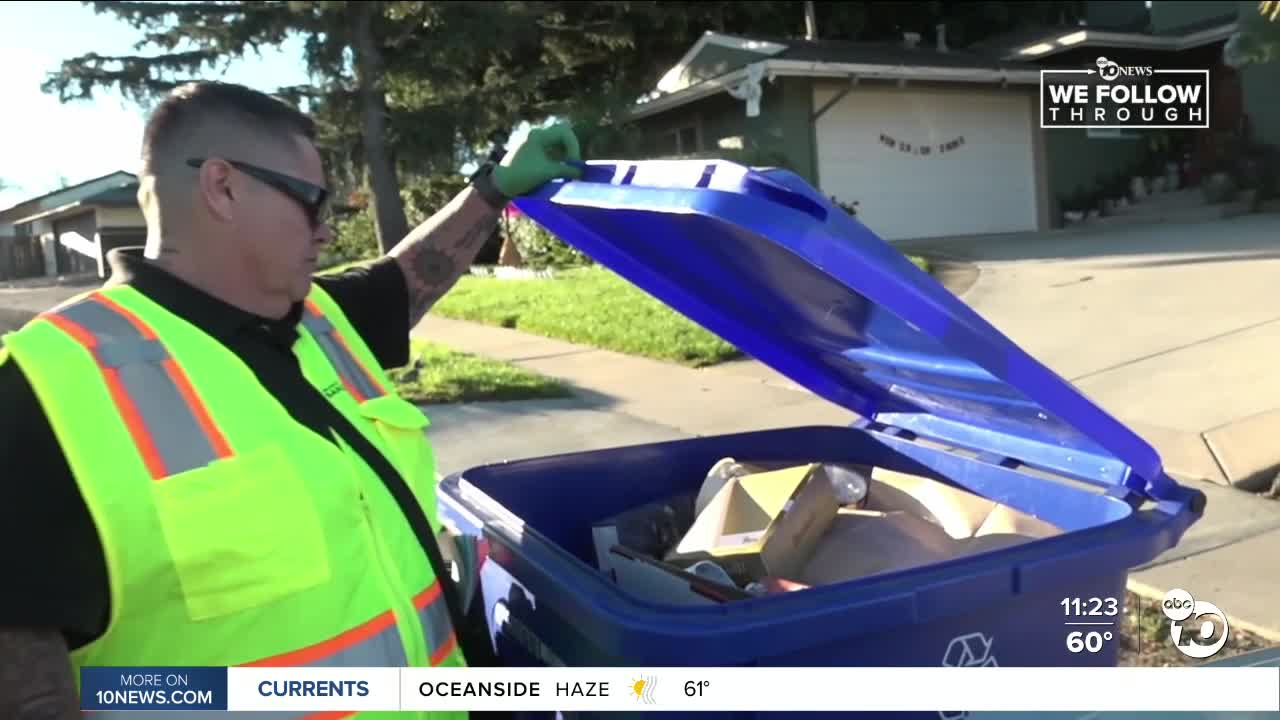SAN DIEGO (KGTV) - After ABC 10News anchor Jared Aarons reported on the City of San Diego's "lid lifter" program to check people's waste bins, viewer comments flooded social media.
San Diego residents wondered about the cost, the effectiveness, and the purpose of sending teams of crews to inspect everyone's trash, recycling, and organic waste bins.
Aarons took those comments to the city to get some answers and explanations.
Alexander Galasso, who manages the city's Waste Reduction Program, said San Diego residents are performing well when it comes to properly sorting their waste.
"When people are given the option of doing the right thing, they want to do that. Especially because this is our home," Galasso said.
Since early October, the city's lid lifters have inspected more than 20,000 containers. They've identified approximately 1,300 minor violations and 40 major contaminants. The program provides educational notes and information to homeowners to help correct sorting issues. The city also issues "oops tags" or non-collection stickers on the bins to let people know what needs to be corrected.
However, the enforcement efforts have drawn criticism, particularly regarding costs. Many residents questioned spending taxpayer money on the program while the city faces budget deficits.
Galasso addressed these concerns by explaining the program's necessity and structure.
"First and foremost, it's actually a regulatory requirement," he said. "Every city across California has to do this because of SB 1383."
That bill passed in 2016 and went into effect in 2022. It requires Californians to recycle their organic waste and it also overhauled how cities enforce waste reduction efforts.
Galasso emphasized that existing code officers handle the inspections as part of their regular duties.
"Our code officers are already in the field for various reasons. This is only a few hours in the morning. They get here, they get set up with their routes, they head out, they beat the trucks, then they go about their day. It's actually part of their jobs, it's in their respective zones," Galasso said.
The program focuses on education rather than punishment.
"At the end of the day, our goal is not to enforce, our goal is to educate and change behaviors," Galasso said.
When asked about the inspection process, Galasso acknowledged that safety limitations prevent workers from digging deep into containers.
"Unfortunately, because of safety reasons, we can't be digging in there. But, the good part of it is we're able to see, outside of the extremely filled containers, you can get a pretty good understanding of what's inside of your typical trash, recycling bin," Galasso said.
Some viewers wondered if the city looked into any other ways they could do these inspections to save money or manpower.
"This is what we have available to us right now." Galasso responded. "There are other cities across the state trying different tactics. But for us, being able to go out there, be in the zone, get the feedback, write it down, and report it back to our education team, this is the best, most effective way of doing it."
The city plans to inspect each bin at least once annually. According to Galasso, the most common violation leading to educational tags is plastic bags placed in recycling bins. Simply put, he says any kind of plastic bag, even if it's labeled as "compostable" or "recyclable," should go into the gray garbage bin.
More information on the city's trash regulations can be found at https://www.sandiego.gov/environmental-services/collection/general.
This story was reported on-air by a journalist and has been converted to this platform with the assistance of AI. Our editorial team verifies all reporting on all platforms for fairness and accuracy.




